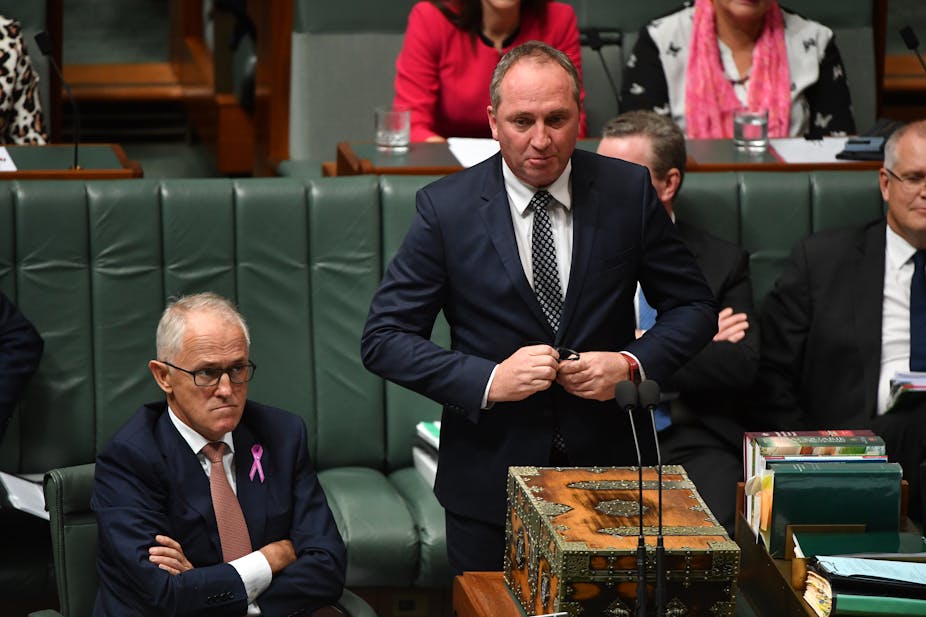In the most spectacular manner, Malcolm Turnbull has publicly trashed his relationship with Barnaby Joyce.
The results of what one Nationals source described as Turnbull’s “roll of the dice” at Thursday’s extraordinary news conference are unpredictable.
Turnbull gave his deputy prime minister no notice of the swingeing attack he would launch on Joyce’s extramarital affair with his former staffer, Vikki Campion, now his pregnant partner.
Joyce had made a “shocking error of judgement”, Turnbull said, which had “set off a world of woe” for all the women affected and “appalled all of us”.
Turnbull was announcing he was putting a sex ban into the ministerial code of conduct. He’d consulted his colleagues on that. But it was the excoriation of Joyce that came out of the blue, stunning the Nationals.
After a week-and-a-half of political hell, Joyce was already in about as bad a place as one can imagine a politician might be, short of the dock of a courtroom.
Turnbull all but disowned him – as far as a Liberal prime minister can do with the leader of the Coalition’s minor party. It was clear Turnbull would just like Joyce to stand down.
Joyce had already been dispatched on gardening leave for next week, when he was due to be acting prime minister. Turnbull said he had “encouraged” him to take leave.
That in itself said it all. If Joyce is too much of a political handicap to undertake the routine duties of acting prime minister, it is hard to argue he’s up to being deputy prime minister.
Within the Nationals Joyce shored up his position on Wednesday to give himself a chance of rehabilitation. But after Turnbull’s character reference, he might as well wear a sandwich board saying: “I’m a terrible person”.
After days of the opposition and media trawling through the work arrangements for Campion, and the free accommodation in Armidale Joyce got from a local businessman, Turnbull says Joyce has given him “an unequivocal assurance” he hasn’t breached ministerial standards.
With abundant caution Turnbull quotes Joyce’s word, rather than his own judgement, and there’s been no independent assessment.
Maybe Joyce has been within the code. But now Turnbull has made it clear – after initially wanting to keep away from Joyce’s private life – that he believes the Nationals leader has breached decent moral standards and he has decided to call him out on that.
A week ago, Turnbull was describing the Joyce imbroglio as “a deeply personal matter relating to Barnaby Joyce and his family”. On Thursday he radiated absolute disgust at the sordid saga.
Turnbull’s approach went from initially staying solid with Joyce by saying as little as possible to letting him have it with both barrels.
It went from dismissing a proposal from crossbencher Cathy McGowan for a “conversation” about workplace relations in parliament to slapping on a sex ban that doesn’t even exempt a minister who’s single.
What changed? The story had gone from something potentially containable to a cluster bomb damaging the whole government, and presumably feeding into the next Newspoll.
In particular, it threatened a dangerous backlash among women. Turnbull has pitched the ban on sexual relationships between ministers and their staff with a heavy gender emphasis. “Most of the ministers, most of the bosses in this building” were men, he said.
The ban is similar to that recently passed by the US House of Representatives, although that is legislated and this is not.
Remember Julie Bishop’s reaction to the American ban – “we wouldn’t want to cross the line so that the moral police were able to dictate what happens between consenting adults”. Turnbull has put his policeman’s helmet on.
Joyce started Thursday deeply wounded. He ended the day bleeding even more heavily. The stories won’t let up. He faces the firing line again when the House of Representatives resumes the week after next. He’ll also be pursued in Senate estimates.
His office is inundated daily with slews of media questions; he lives with the knowledge that fresh damaging information could destroy him.
Imagine his political life from now. Travelling regional Australia’s back blocks will be downright embarrassing, as he wonders what those women offering cups of tea are thinking.
As well, he’ll be dealing with the demands of his new domestic circumstances – including the glare of publicity around the baby, arriving within weeks – as well as the legacies of leaving his old home life.
The Nationals are in an appalling situation.
They’ve stuck by Joyce – they think he’s the best they’ve got and their default position is loyalty. They’ve given him time. But logically, they should bring forward their assessment of the chances of his getting back on his feet.
Assuming they are slight, the party would be better to face the fact quickly and give a new leader – who’d likely be the little known Michael McCormack, a junior minister – maximum time before the election.
But that’s where Turnbull’s “roll of the dice” comes in. The Nationals this week were prickly about perceived meddling from the Liberals. They don’t like outside interference. How will they react to Turnbull’s assault? Will they dig in further behind Joyce?
And then there’s Joyce himself – stubborn and presumably desperate. He’s not so far shown any sign of giving in under political and personal pressure that would drive most leaders out. He’s relying on being able to keep his grip on the parliamentary numbers.
“He’s not like everyone else – he’s a different cat,” says a colleague.
Joyce is fighting like a cornered tiger to hang onto the position he coveted for so long. It’s not clear whether Turnbull’s denunciation has harmed or helped his chances. Or how, in the immediate future, he and Turnbull can work together.

